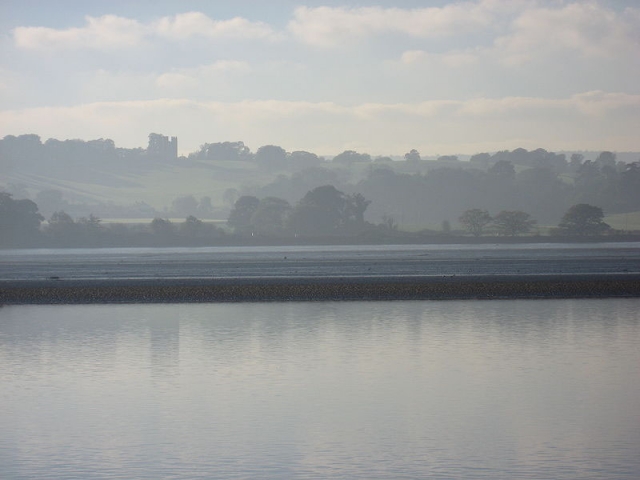Story-telling and simulation exemplar: The Great Exeter Fish War of 1309
Exemplar

The lesson was taught to 44 Year 3 children in a first school in Exeter. It describes how a story was used to introduce a local history unit, and how we followed it up.
To begin, we sat the children on the carpet and told them John Hooker's story about Hugh Courtenay, Earl of Devon, and his quarrel with the mayor and citizens of Exeter. (See Great Exeter Fish War for Hooker's account.) I first explained what an earl, a countess and a bishop were, and their positions in mediaeval society.
I told the story in the present tense. First I set the scene, then I described the events, using plenty of dialogue. I ended with the hatred of the Earl hanging over the city. The children were enthralled and indignant and, to a child, they condemned Earl Hugh as a bully. We now posed three key questions about the story:
Q What was the quarrel about? (question to check understanding)
Q Can we believe John Hooker's story? (testing the evidence question)
Q What could the Exeter Chamber do about the quarrel between the Earl and the town? (open-ended question to encourage speculation about the past).
We had a quick discussion about the quarrel, with several children giving their opinions. They showed good understanding of the issues.
Testing the evidence
We broke the news that although the events in the story happened 700 years ago, they were written down by John Hooker only 400 years ago. He lived 300 years after the quarrel - was his story likely to be reliable? How would he have known what happened?
Tom: From his ancestors.
Sam: He could have got it from a book.
The only contemporary document about the dispute between the Courtenays and the city of Exeter is a 1290 jurors' statement about the Countess of Devon's weir. She was Earl Hugh's aunt.
The Countess had raised a weir across the River Exe, beside her castle which was downstream of the city. This had ruined the fishing for Exeter's fishermen upriver from the weir. Worse, the weir prevented shipping from sailing up the river to the city. Instead, ships now had to unload their goods at the Countess's weir and pay customs dues on them. The goods were then transported overland to the city.
The children decided that this document fitted in well enough with John Hooker's story, though they would have preferred it if the arch-villain, Earl Hugh, had raised the weir, rather than his aunt.
Simulation
We now divided the class into groups of three, telling the children that they were the members of Exeter's Chamber 700 years ago.
The problem was the new weir with which the Courtenays had blocked the river, and the tolls and dues they were exacting on the river trade. What could the Exeter Chamber do about the quarrel between the Earl and the town? The 'members' discussed possible solutions for five minutes. Each group then reported its favoured solution to the whole Chamber. We wrote their proposals on the board. Their suggestions were:
1. Break the weir.
2. Kill Earl Hugh.
3. Put a magic spell on him.
4. Refuse to pay dues for landing goods at his quay by the weir.
5. Be kind to Earl Hugh.
I quickly asked permission to add my own suggestion as a sixth option (graciously granted by the Chamber). It was to vote for none of the above.
Discussion and debate
We now held a full Chamber debate, discussing each option before putting the matter to the vote. The children argued each option long and passionately, with us encouraging objections from the floor and generally acting as agents provocateurs. The feasibility of each proposal was thoroughly discussed. When the vote was taken, the rather surprising result was:
Option 1 - 3 votes
Option 2 - Nil votes
Option 3 - 4 votes
Option 4 - 12 votes
Option 5 - Nil votes
Option 6 - 25 votes
By testing their ideas against each other and the teacher in debate, the class had moved from an unrealistic view of the possibilities open to them as the city Chamber, to a position of uncertainty, needing new thinking.
What other options were open to the Chamber? We now questions about power, such as:
Q Who could make Hugh take away his weir?
Q Who was more powerful than him?
It didn't take the children long to arrive at the king. They decided to write a petition to him, and duly did so in the next lesson.
The city's petitions were unsuccessful for 250 years because the Courtenays were favourites of the monarchy. Only in Tudor times, when a later Earl of Devon proved traitorous to Henry VIII, did the city finally win through and gain permission to remove the weir, tolls and dues.
We ended as we had begun, with a story - this time the children's stories of the whole saga, written in cartoon form.
Attached files:
- Great Exeter Fish War
70.3 KB PDF document

